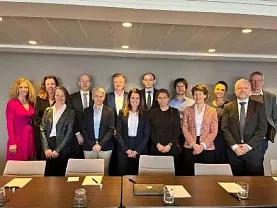
On February 5th, EPEE together with coolingEU held an event in the European Parliament, with MEP Peter Kouroumbashev (S&D, Bulgaria) and MEP Adam Gierek (S&D, Poland) on cooling & refrigeration’s role in fulfilling the EU’s pathway to decarbonisation.
EPEE Director General, Andrea Voigt officially welcomed the large number of participants and recalled that cooling and refrigeration are often taken for granted, yet play a key role in our daily lives and have the potential to help the EU reduce its environmental impact.
Peter Kouroumbashev provided some insights into the EU’s progress in fulfilling its climate goals through the EU’s Clean Energy Package. He outlined the relevance of the electricity market for the heating and cooling sector by stating that EU stakeholders should “discuss the production, transportation, distribution and use of energy, and not only what end-users do with it.” He added that stakeholders must adopt a holistic approach towards the energy efficiency transition by also focusing on EU citizens’ behaviour: “we need to make citizens our partners and not our enemies”.
Speakers in the first panel included Adam Gierek who was the European Parliament’s Rapporteur for the EU Strategy for Cooling in 2016, and Paolo Bertoldi from the Joint Research Centre in charge of drafting the IPCC Special report on 1.5°C. Adam Gierek acknowledged that the Primary Energy Factor (PEF) plays a key role in the current energy transition.He also emphasised the link between the construction and heating sectors by stating that “in the absence of a good insulation system, even the best heat pump will not work correctly.” Paolo Bertoldi presented the IPCC Special report on 1.5°C conclusions, underlining that “limiting global warming to 1.5ºC would require rapid, far-reaching and unprecedented changes in all areas of society including consumption, education or construction”.
Ingo Wagner from coolingEU introduced the second panel composed of representatives of the cooling & refrigeration industry, whose presentations focused on the contribution of the cooling and heating sector in achieving the energy transition by 2050 while promoting sustainable development. Paul de Larminat from the Global Food Cold Chain Council (GFCCC) reminded the audience about the high impact of indirect emissions in the cooling and heating sector. “We talk a lot at the EU level about the F-Gas Regulation and reducing the Global Warming Potential (GWP) of refrigerants, but we must not forget indirect emissions related to energy consumption which have by far the highest impact.” He concluded that “businesses have a societal responsibility to fulfil people’s needs while respecting the environment.” Torben Funder-Kristensen from Danfoss illustrated this argument with the tangible example of supermarkets, which can be real energy “prosumers” provided they make better use of their energy resources. “There is high savings potential for supermarkets, many of which use their compressors’ power left for heating.” He also explained the benefits of thermal storage in terms of providing flexibility in electricity consumption. Gérald Cavalier from Cemafroid emphasised the key role of refrigeration in guaranteeing the quality and security of food and health cold chains for European consumers. He highlighted the importance of refrigeration in reducing food waste and therefore the sector’s environmental footprint. “25% of the food produced today never reaches the consumer. There is a strong correlation between food losses and refrigeration equipment.” The solution highlighted by most of the speakers is to accelerate targeted investment in cooling and refrigerant technologies.
Francesco Ferioli from DG ENER presented the key conclusions from the European Commission’s Clean Energy for All Strategy, in which all sectors must contribute to a GHG emissions reduction trajectory in a 1.5°C scenario. He mentioned that by 2050, primary energy will mostly come from renewable sources, and the share of electricity in heating would increase from 14% in 2030 to 22-44% in residential applications by 2050. He also explained the key role of increased targeted investments in the economy such as zero-carbon solutions.
Andrea Voigt thanked the audience and concluded that “it is feasible to reach the 1.5°C target, but in order to do so we need to accelerate, and we require a European vision to ensure the further uptake of efficient technologies by citizens, through more targeted investments and proper governance.
The detailed program of the event and speaker’s presentations are available on EPEE website.